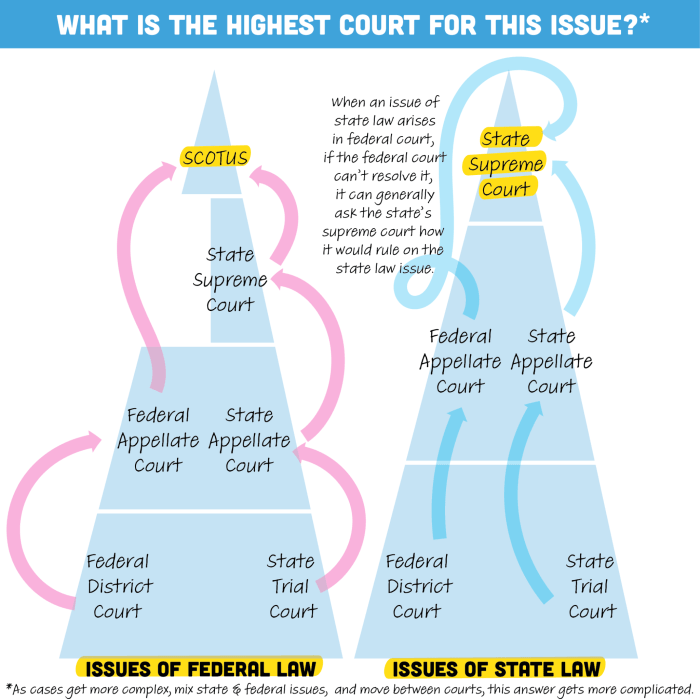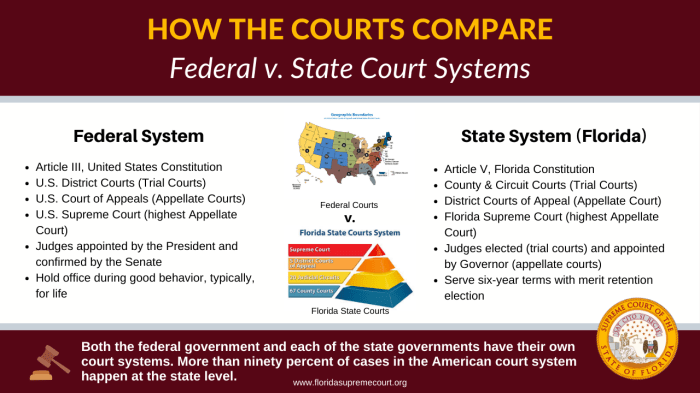A federal case typically originates in a state court, setting the stage for a complex and intriguing legal journey. This article delves into the intricacies of this process, exploring the reasons why cases are initially filed in state courts and the mechanisms for their removal to federal jurisdiction.
The diverse nature of legal disputes necessitates a nuanced understanding of the roles played by both state and federal courts. State courts handle a wide range of cases, including those involving family law, criminal offenses, and civil matters. However, certain cases, such as those involving federal questions or diversity of citizenship, may be more appropriately adjudicated in federal courts.
Overview of Federal and State Court Systems

The United States has a dual court system, consisting of both federal and state courts. Federal courts have jurisdiction over cases that involve federal laws or the U.S. Constitution, while state courts have jurisdiction over cases that involve state laws or local ordinances.
Some cases typically originate in state courts, such as:
- Contract disputes
- Personal injury cases
- Property disputes
- Family law matters
- Criminal cases
A case may be removed from state court to federal court if it meets certain requirements, such as involving a federal question or involving parties from different states with a large amount of money at stake.
Reasons for Originating in State Court

There are several reasons why certain cases are more likely to be filed in state court than in federal court:
- State laws govern many aspects of daily life,such as contracts, property, and family law. Therefore, cases involving these matters are typically filed in state court.
- State courts are often more accessiblethan federal courts, both in terms of location and cost.
- State courts have a broader range of jurisdictionthan federal courts, meaning they can handle a wider variety of cases.
Federal Question Jurisdiction: A Federal Case Typically Originates In A State Court

Federal question jurisdiction allows federal courts to hear cases that involve a substantial federal question. A federal question is a question that arises under the U.S. Constitution, federal laws, or treaties.
Examples of cases that fall under federal question jurisdiction include:
- Cases involving the interpretation of the U.S. Constitution
- Cases involving the enforcement of federal laws
- Cases involving disputes between states
To determine whether a case involves a federal question, courts look to the “well-pleaded complaint rule.” This rule states that a case arises under federal law if the plaintiff’s complaint establishes that the case involves a federal question.
Diversity Jurisdiction
Diversity jurisdiction allows federal courts to hear cases between citizens of different states when the amount in controversy exceeds $75,000.
To meet the requirements for diversity jurisdiction, the following conditions must be met:
- The plaintiff and defendant must be citizens of different states.
- The amount in controversy must exceed $75,000.
- The case must not be a “diversity-exception” case, such as a case involving a federal question or a case between a citizen and a foreign state.
Diversity jurisdiction is important because it ensures that citizens have access to federal courts even when the case does not involve a federal question.
Removal of Cases to Federal Court
A case may be removed from state court to federal court if it meets certain requirements. The grounds for removal include:
- Federal question jurisdiction
- Diversity jurisdiction
- Removal on the basis of a federal defense
To remove a case to federal court, the defendant must file a notice of removal with the federal court within 30 days of being served with the complaint.
Examples of cases that have been successfully removed to federal court include:
- Cases involving patent infringement
- Cases involving copyright infringement
- Cases involving securities fraud
FAQ Guide
Why do federal cases typically originate in state courts?
Federal courts have limited jurisdiction, meaning they can only hear cases that fall within specific categories, such as those involving federal questions or diversity of citizenship. Most cases do not meet these criteria and are therefore filed in state courts.
What is the process for removing a case from state court to federal court?
A party may remove a case from state court to federal court by filing a notice of removal within 30 days of being served with the complaint. The notice of removal must state the grounds for removal, such as federal question jurisdiction or diversity of citizenship.
What are the benefits of removing a case to federal court?
Removing a case to federal court can provide litigants with access to a broader range of legal remedies, such as federal statutes and case law. Additionally, federal courts may offer certain procedural advantages, such as the right to a jury trial in certain cases.